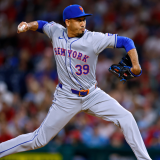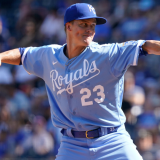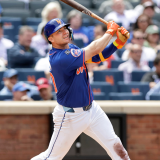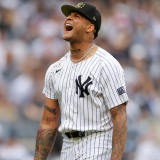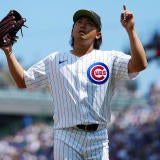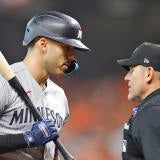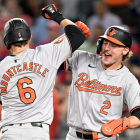On Jan. 22, the BBWAA will announce on MLB Network who the newest members of the Baseball Hall of Fame will be. Players receiving at least 75 percent of the vote from the writers will join veterans committee selections Harold Baines and Lee Smith to be enshrined in Cooperstown, N.Y., this coming summer.
As is always the case these days, it's a polarizing ballot. In the coming days, we'll be taking a deeper dive on first-timers Mariano Rivera, Roy Halladay and Todd Helton along with players who got at least 20 percent of the vote last year: Edgar Martinez, Mike Mussina, Roger Clemens, Barry Bonds, Curt Schilling, Omar Vizquel, Larry Walker, Fred McGriff and Manny Ramirez.
First-timers on the ballot sure to fall off after one vote who should still be commended for long and good MLB careers: Placido Polanco, Kevin Youkilis, Derek Lowe, Freddy Garcia, Vernon Wells, Ted Lilly, Travis Hafner, Jason Bay, Jon Garland, Darren Oliver, Juan Pierre and Rick Ankiel.
In between all that is a big illustration of just how crowded the ballot is. Let's talk about those remaining players on this ballot.
Jeff Kent was one of the best offensive second basemen, especially in terms of power, in history. Among primary second basemen, he holds the record for home runs, is third in RBI and second only to Rogers Hornsby in slugging percentage. He won an MVP. He's 19th in WAR, which is below the average Hall of Fame second baseman but ahead of eight Hall of Famers, including Bobby Doerr, Nellie Fox and Johnny Evers. Kent peaked at 16.7 percent of the vote (2017) but dipped to 14.5 percent last year. This is his sixth season on the ballot and he's not getting in unless it's by way or Baines and Smith.
Gary Sheffield was one of the best and most feared hitters in baseball for roughly 15 years. He slashed .292/.393/.514 (140 OPS+) with 509 home runs (26th all-time), 1676 RBI (29th), 1636 runs (39th). He's one of 23 players in history with at least 1,600 RBI and runs. He's also 21st in career walks and he walked 304 more times than he struck out, an extra-impressive feat given the era in which he played. He's dragged down by defense, the "character" clause and reported connections to PEDs for some. For me, I think it's terrible that he has never gotten more than 13.3 percent (2017) and dipped to 11.1 percent last year. This is his fifth try.
Billy Wagner was a dominant closer for a long time -- long enough that he racked up 422 career saves, good for sixth all time. He was also much better at run prevention than several other relievers in the Hall. His 187 ERA+ is better than every Hall of Fame reliever and only worse than soon-to-be-Hall-of-Famer Mariano Rivera. He bests Trevor Hoffman, sometimes comfortably, in ERA, WHIP, strikeout rate and several other rate stats. He did get his highest vote total yet last year, but it was 11.1 percent.
Scott Rolen has become a darling for fans of advanced stats. He sits 10th in JAWS among third basemen and the nine ahead of him are either already in the Hall or headed that way (Adrian Beltre). He's above the threshold of an average Hall of Fame third baseman and it's already arguably the most underrepresented position in the Hall. He won eight Gold Gloves at third while authoring a .281/.364/.490 (122 OPS+) slash line with 517 doubles, 316 homers and 118 steals. He was a five-tool star. Rolen only got 10.2 percent of the vote his first time around, though. We'll see if there's a Year 2 bump before making a big judgement, but the gut feeling is he started too low to make it.
Sammy Sosa was an absolute rock star from 1998-2003. Arguably, he made the 1998 Mark McGwire home run chase much more fun and the duo helped resurrect baseball following the 1994 strike. He is the only player in baseball history with three 60-plus home run seasons and his 609 home runs rank ninth in history. There was the corked bat incident, his ties to PEDs and his performance in front of Congress, but I can't wrap my head around the people who are OK with voting for Manny Ramirez just completely scoffing at Sosa's candidacy (I've argued he has become vastly underrated before). He got 12.5 percent of the vote his first year, but was at 7.8 percent last year and this is his seventh try.
Andruw Jones, speaking of underrated, seems to be unfairly judged more for the second half of his career than properly judged for the incredible first half. Through 2006, Jones had a 116 OPS+ with 303 doubles, 342 home runs, over 1,000 RBI, 133 stolen bases and was one of -- if not THE -- best defensive center fielders of all time. He was absolutely on a Hall of Fame track and then fell apart. Still, the completed product sits with 434 home runs, over 1,200 runs and RBI, a 111 OPS+ and sits 11th in JAWS. He's a touch below the average Hall of Fame center fielder, but ahead of Hall of Famers like Richie Ashburn, Andre Dawson, Kirby Puckett, Hack Wilson and more. I'm kind of on the fence with Jones, but it doesn't really matter. He got 7.3 percent of the vote in his debut on the ballot last year.
Andy Pettitte might be a favorite among some in the old guard. He won 256 games (42nd all time) and was an important member of the rotation for 13 playoff teams, eight pennant winners and five World Series champions. He went 19-11 in his postseason career. He racked up well over 3,000 innings in the regular season and ranks 42nd all-time in strikeouts. Pettitte ranks 90th among starting pitchers in JAWS, though, and I can't imagine he'll even get 10 percent of the vote. He might even get less than 5 percent and fall off the ballot in his first year.
Lance Berkman slashed .293/.406/.537 (144 OPS+) with 422 doubles, 366 home runs and 1,234 RBI in his career. In 52 postseason games, he hit .317/.417/.532 with nine home runs and 41 RBI. That's gotta prop him up a bit, right? He did win a ring in 2011, too. JAWS has him 20th among left fielders, right with Ralph Kiner and ahead of some Hall of Famers. He's well below the average and doesn't have a shot of getting in. I thought he deserved a nod here for being a bit underrated, though.
Roy Oswalt finished in the top five of Cy Young voting in five of his first six seasons. He tailed off, but he looked the part for the first half or so of his career and finished with a 3.36 ERA (127 ERA+) in 2,245 1/3 innings. He was also the 2005 NLCS MVP. He's 102nd among starters in JAWS and will fall off the ballot after this first try.
Miguel Tejada in his prime was something else. From 2000-06, Tejada hit .297/.351/.498 (121 OPS+) with an average of 37 doubles, 29 homers and 116 RBI per season. He played 162 games every season from 2001-06. He drove in 150 in 2004. He hit .330 in 2006. He won the 2002 AL MVP. He finished with 2.407 career hits, 307 home runs and 1,302 RBI. Among his top 10 statistical similars we see Robinson Cano, Ryne Sandberg, Alan Trammell, Carlton Fisk, Yogi Berra, Scott Rolen and Joe Cronin. He's 27th among shortstops in JAWS, which is below average but ahead of a few Hall of Famers such as Phil Rizzuto. He also was suspended for 105 games for a second positive amphetamine test and might not even get a single vote.
Michael Young was a seven-time All-Star with 2,375 career hits and a .300 career batting average. He's also 96th in JAWS and has no shot.
Do I think all those guys should be Hall of Famers? Absolutely not. The cutoff for me is probably between Jones (possibly in) and Pettitte (out), but everyone there is worthy of at least a cursory discussion and instead, most of them are either buried of immediately dismissed. It's a 35-man ballot where I think there are around 20 players worthy of a discussion but there are only 10 spots on the ballot.
Regardless, we're in the home stretch of arguing about the Hall of Fame season. Let's get it on!







